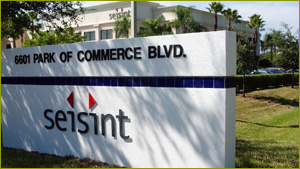
Part 1 2 3 4 5
 | Seisint Inc. in Boca Raton, Fla. is the creator of the Multistate Anti-Terrorism Information Exchange (MATRIX).
(AP Photo/J.Pat Carter) |
After Hank Asher's White House meeting in 2003, the Homeland Security and Justice departments granted a combined $12 million to help in the development of Matrix. Another sign of the big future that some predict for Asher's invention: In July of 2004, Lexis-Nexis bought his company, Seisint, for more than three-quarters of a billion dollars. Hank Asher's take: almost $275 million.
Asher concedes that authorities wanting to, say, harass their political enemies would have a powerful tool in Matrix.
"When you take somebody with that much power," says Asher, "and you have a president or the head of the FBI that would order something like that to be done, my system would just do it faster than the other ones would. I would certainly hope we don't have that type of leadership, and I don't believe we do."
The government's quick embrace of tools like Matrix was part of a push to gather and share information among intelligence and law enforcement agencies much more efficiently. This push also relied on dramatically expanded legal powers.
"Our responsibility was to do anything and everything we could under the Constitution to prevent further acts of terrorism," Attorney General Ashcroft said at New York's Federal Hall in 2003. "So we fought for the tools necessary to protect the lives and the liberties of the American people. Congress provided these tools in the USA Patriot Act, passed overwhelmingly by bipartisan majorities."
Congress passed the historic Patriot Act just 45 days after 9/11. With relatively little public debate, lawmakers undid a generation of restraints on the gathering and sharing of domestic intelligence. The act allows the FBI to wiretap American citizens who are not criminal suspects, and enables police to share investigative information with the Central Intelligence Agency.
And it makes it easier for investigators to access the trail of data each of us leaves behind every day: travel records, cell phone calls, even books we've bought or checked out at the library. Among the most alluring sources of information for investigators are banks, which are now required to monitor customers on behalf of the government, and the Internet, where we Americans live more and more of our lives.
We get a tour of the Earthlink data center with Les Seagraves, the company's assistant general counsel and chief privacy officer.
Based in Atlanta, Earthlink is one of the largest Internet service providers, right behind the giants, AOL and Microsoft. It has more than five million customers.
"Any incoming and outgoing mail is run through these servers," says Seagraves. "It's about 100 [million] to 130 million e-mails coming in per day."
It's part of Seagraves' job to handle subpoenas and court orders from police and national security officials.
"Most of the time it's to identify people," says Seagraves. "They'll have a bit of information, an e-mail address, something that they're looking to identify - who is this, who sent this, you know, who is this person? And those are pretty routine."
In other cases, government orders require Seagraves to actually intercept e-mails so authorities can look at their contents. The Patriot Act made it much easier for agents to get data from companies like Earthlink, and to do so secretly under something called FISA, the Foreign Intelligence Surveillance Act. So if the government is reading your e-mail, you'll probably never know.
"The federal law says that it's a criminal act if I tell you anything about a FISA order that I've gotten," says Seagraves.
What would happen if he talked about it?
"I would probably go to jail. In fact, I've been told by the FBI that I would go to jail."
Continue to Part 4
|



